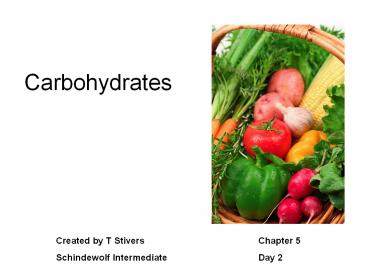Carbohydrates - PowerPoint PPT Presentation
1 / 9
Title: Carbohydrates
1
Carbohydrates
Created by T Stivers Schindewolf Intermediate
Chapter 5 Day 2
2
Six Basic Nutrients
- Carbohydrates
- 2. Proteins
- 3. Fats
- 4. Vitamins
- 5. Minerals
- 6. Water
3
Carbohydrates
- are the __________ and _________
- in food
X
starches
X
X
sugars
energy
They are the main ________ source for the body.
4
2 Kinds of Carbohydrates
- 1. Simple carbs natural sugars
2. Complex carbs starches that change to
simple sugars
5
Complex Carbs are found in Whole grains Seeds
Legumes (dried peas and beans) Tubers (root
veggies like potatoes)
Starches
This includes _______ - the tough stringing
parts of veggies, fruits, and whole grains. It
_________ be digested but it helps move waste
through system.
fiber
cannot
6
Carbohydrates
Simple carbs- natural sugars
used for
simple sugar
Glucose
Energy
Complex carbs convert from starch to
Left over
Stored as fat tissue
7
Carbohydrates that we eat make our blood glucose
(sugar) rise. To utilize the carbohydrates and
lower the blood sugar, insulin opens the doors of
the body's cells to glucose circulating in the
blood. The glucose enters the cells and is used
as the cells' fuel for energy. Insulin binds to a
spot on the cell surface called a receptor.
Likened to a lock and key, insulin is the key
that opens up the lock (receptor) so that glucose
can pass through the door into the cell. Using
this analogy in type 1 diabetes, the keys have
been stolen (no insulin is made by the pancreas).
In type 2, the door won't open fully even with
the right key (insulin resistance).(Source
Christopher D. Saudek, Richard R. Rubin, and
Cynthia S. Shump. The Johns Hopkins Guide to
Diabetes. Baltimore The Johns Hopkins University
Press, 1997.)
8
Complex carbs starchy foods like potatoes,
rice, and pasta and fiber foods such as whole
grain products, stringy veggies and fruits
White foods
Simple carbs natural or synthetic sugars like
fruits and candy
9
Six Basic Nutrients
- Carbohydrates 50 of your meal
- 2. Proteins
- 3. Fats
- 4. Vitamins
- 5. Minerals
- 6. Water































